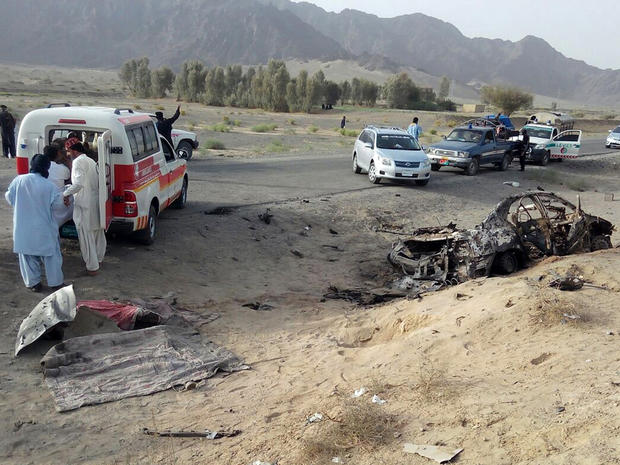Another U.S.-led assassination on its soil angers Pakistan
It's become a somewhat familiar story in the war on terror: The United States was presented with strong evidence that one of its highest-valued terrorist targets was inside Pakistan and exposed, so they assassinated him. In response, Pakistan rails against what it says is a breach of its sovereignty.
Although there have been several instances like that, the most famous happened in 2011, with 9/11 mastermind Osama bin Laden. He was found to be hiding in the town of Abbottabad in a compound a short distance from Pakistan's top military academy.
This weekend, it was the Taliban's leader, Mullah Akhtar Mansour, in Baluchistan province, in southwestern Pakistan.
Early Monday, the White House confirmed that Mansour was dead. President Obama, in Hanoi at the start of a trip to Vietnam and Japan, said in a written statement, "Today marks an important milestone in our longstanding effort to bring peace and prosperity to Afghanistan. With the death of Taliban leader Akhtar Mohammad Mansur, we have removed the leader of an organization that has continued to plot against and unleash attacks on American and Coalition forces, to wage war against the Afghan people, and align itself with extremist groups like al Qaeda."
In a statement late Sunday, Pakistan's Foreign Ministry repeated the country's protest of drone attacks on its territory. It also repeated Pakistan's preference to settle the protracted war in Afghanistan through talks, calling on the Taliban to renounce violence in favor of negotiations.
"While further investigations are being carried out, Pakistan wishes to once again state that the drone attack was a violation of its sovereignty, an issue which has been raised with the United States in the past as well," it said.
The Pakistani government issued a similar angry call about the raid on bin Laden in 2011, and they have in other instances of U.S. drone strikes and assassinations of top terrorist targets in their territory since then.
Afghan and U.S. officials have repeatedly accused Pakistan's ISI intelligence agency of keeping the Taliban and other terrorist groups' leadership safe in cities across the porous and lawless border. A senior Afghan official, speaking on condition of anonymity because he was not authorized to talk to the media, complained before Mansour's death was announced that Taliban fighters were being taken from the battlefields of Afghanistan to Pakistani hospitals.
In 2012, after a drone strike killed al Qaeda's second-in-command in Pakistan, then-Defense Secretary Leon Panetta addressed the problem and dismissed Pakistan's complaint about its sovereignty, saying similar attacks will continue as long as the U.S. needs to defend itself against terrorists that threaten America.
"This is about our sovereignty as well," Panetta said.
He was blunt about the difficulties in the U.S. relationship with Pakistan, as insurgents continue to find safe haven there, despite repeated protests from American leaders.
"It's a complicated relationship, often times frustrating, often times difficult," Panetta said. "They have provided some cooperation. There are other times when frankly that cooperation is not there. But the United States cannot just walk away from that relationship. We have to continue to do what we can to try to improve (the) areas where we can find some mutual cooperation."

